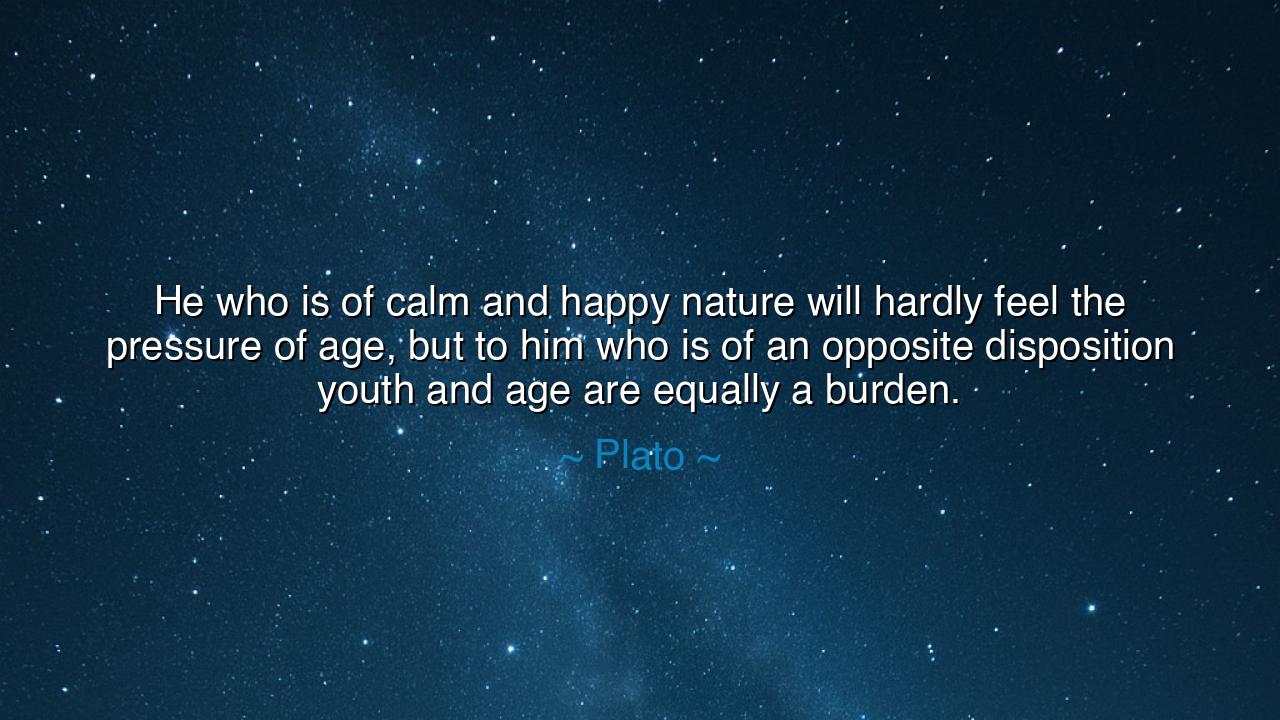
He who is of calm and happy nature will hardly feel the pressure
He who is of calm and happy nature will hardly feel the pressure of age, but to him who is of an opposite disposition youth and age are equally a burden.






"He who is of calm and happy nature will hardly feel the pressure of age, but to him who is of an opposite disposition youth and age are equally a burden." These words from Plato invite us into a profound exploration of the human spirit and the nature of aging. In this quote, Plato reminds us that the internal state of a person—their disposition—determines how they experience life, particularly as it moves through the stages of youth and old age. To those who possess a calm and happy nature, age is not a burden. Rather, it is a natural progression of life, something that is embraced with grace and equanimity. However, for those whose hearts are filled with restlessness, anxiety, or discontent, both youth and old age feel heavy, for they are never truly at peace with themselves or their circumstances. This quote speaks to the power of inner peace and how our emotional and mental states shape our experience of life, regardless of how many years pass.
The ancients understood the deep connection between the mind and body. The Stoics, especially philosophers like Epictetus and Marcus Aurelius, taught that contentment is not derived from external circumstances—such as wealth, status, or even health—but from the peace of the mind. Epictetus famously said, "Wealth consists not in having great possessions, but in having few wants." The Stoics believed that true freedom, and by extension true happiness, comes from accepting what we cannot control and finding peace in the face of it. Age, for them, was a natural part of the human experience, and it was to be accepted and embraced with wisdom and serenity, not feared or resented. Plato, echoing these sentiments, teaches that those who find contentment within themselves—those who cultivate an inner peace—will face the trials of age with grace and equanimity, while others will struggle no matter how young or old they are.
Consider the life of Socrates, Plato’s teacher, who exemplified the Stoic ideals of inner peace and contentment. Socrates lived a life filled with struggle, poverty, and physical discomfort. Yet, he famously faced death with calm acceptance. When sentenced to die by drinking hemlock, Socrates did not mourn or fear the coming of old age or death. Instead, he embraced his fate with a clear mind and a sense of peace, focusing on the pursuit of truth and the well-being of his soul. His life serves as a testament to Plato’s wisdom: it is not the years that weigh heavily on us, but the attitude we adopt towards them. Socrates’ calmness in the face of death illustrates how a peaceful disposition enables us to navigate the trials of both youth and old age with ease, while a restless mind can make even the best of years feel like a burden.
Contrast Socrates with the tragic figure of King Midas, whose story in Greek mythology teaches us about the destructive power of discontentment. Midas, though wealthy beyond measure, was never satisfied with his life. His insatiable greed led him to ask the gods for the power to turn everything he touched into gold, a wish that ultimately became his curse. His riches, instead of bringing him peace, became a burden, as he could no longer enjoy even the simplest pleasures of life—like food or human touch—for fear they would turn into gold. In his old age, Midas found himself not at peace, but isolated and sorrowful, demonstrating that no matter how much time we have, if we do not cultivate a happy nature, both youth and old age can be fraught with misery.
The example of Leonardo da Vinci offers another contrast. Da Vinci, who lived to an advanced age, never grew weary or discontent with the passage of time. His mind remained sharp and full of curiosity throughout his life. He continued to work on his art, explore scientific ideas, and engage with the world until the very end of his days. Da Vinci was an example of someone whose inner peace and passion for learning sustained him, regardless of the physical toll of age. His life demonstrates that, just as Plato suggests, those who are calm and happy in their nature can continue to live fully and meaningfully, regardless of the decay of the body. Wisdom, curiosity, and contentment allowed him to transcend the challenges of aging, to the point where his mind remained as young as it had been in his youth.
The lesson of Plato’s quote is profound: we must not allow time itself to define the quality of our lives. It is our disposition, our attitude, and our mental peace that shape our experience of both youth and old age. Those who are restless, anxious, and discontent will always find themselves burdened by the weight of their own emotions, regardless of their age. But those who cultivate inner peace, who accept the inevitable passage of time with grace, will find that age has little power over them. It is not the number of years that makes life heavy, but the lack of peace in our hearts.
To follow this teaching in our own lives, we must strive to nurture peace within ourselves at every stage of life. We must practice gratitude, mindfulness, and self-reflection, recognizing that every stage—whether of youth or old age—offers its own unique opportunities for growth and fulfillment. Let us focus not on the passage of time, but on how we engage with it: with curiosity, love, and an openness to learning. Let us live with the wisdom to accept what we cannot control, and the strength to cultivate a peaceful heart, no matter the years we have left.






AAdministratorAdministrator
Welcome, honored guests. Please leave a comment, we will respond soon